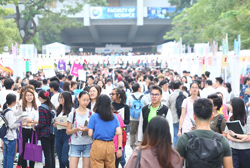
Welcome address to new students
.jpg)
As one contemplates the future of the Greater Bay Area, much has been made of what the blueprint for the region can bring to Hong Kong. However, it is time to flip the narrative and emphasise the strategic value Hong Kong can bring to the ambitious plans for the region’s future.
In the World Intellectual Property Organization’s 2020 Global Innovation Index, Shenzhen, Guangzhou and Hong Kong came second among the world’s top 100 science and technology clusters, which is an impressive achievement. The next five years will see Shenzhen alone investing more than 700 billion yuan (US$109 billion) in research, development and innovation.
With such investment comes demand for well-trained scientists and technologists. In response, Shenzhen is investing major financial and reputational capital in a range of programmes to attract top research talent. It plans to build up to 20 higher education institutions by 2025 to power the hi-tech industries of the future.
Yet, despite being home to China’s largest provincial economy, Guangdong’s gross tertiary enrolment ratio of 46 per cent falls significantly behind the national average of 54 per cent. Mainland China has six universities in the QS top 100 world ranking, yet Guangdong province only managed to break into the top 300 with Guangzhou’s Sun Yat-sen University coming in at 263rd.
The region’s technological and industrial transformation will only be possible if it produces enough highly skilled professionals and attracts enough research talent to power its future economy.
This is where Hong Kong comes in. With five of the city’s eight publicly funded universities in the QS top 100 world university rankings, Hong Kong is a global powerhouse of innovation, research and education. Several of our universities have announced plans to establish satellites or branch campuses across the border, which will add capacity to the region’s higher education and research ecosystem.
The Chinese University of Hong Kong is a pioneer in the Greater Bay Area. Long before the regional policy blueprint emerged from the central government, it launched the Shenzhen Institute of Advanced Technology (SIAT) in 2006 in collaboration with the Chinese Academy of Sciences. It celebrates its 15th anniversary this week at a special forum with an address by Chief Executive Carrie Lam Cheng Yuet-ngor and attended by dignitaries and government leaders on both sides of the border.
SIAT was just the beginning. CUHK established its Shenzhen campus in 2012, creating a comprehensive and research-intensive university. In addition, the Shenzhen Research Institute was founded in 2007 and is home to several research laboratories and dozens of start-ups. Many more Greater Bay Area initiatives will be unveiled at our forum this week.
.jpg)
Apart from driving a pipeline of future talent, Hong Kong’s globally leading strengths in innovative biomedicine represent a real differentiator for it to contribute to the Greater Bay Area. The city could soon overtake New York as the world’s leading hub for biotech finance.
From the Hong Kong stock exchange’s unique pre-revenue-stage IPO mechanism for biotech companies to access capital markets, to our sophisticated medical research system, no other city in the Greater Bay Area can rival Hong Kong’s strengths in this crucial area.
Hong Kong offers access to capital, expertise, global regulatory recognition of its clinical trial data and a network of world-class universities. These collectively represent a biomedical ecosystem that can rival just about anywhere else in the world.
The city’s reputation will be further boosted by plans announced in this year’s policy address, which will see significant extension of the Hong Kong Science Park as well as the release of more land to support the phase 2 development of CUHK’s Medical Centre in what is shaping up as an innovative biomedicine precinct.
This builds on a growing start-up movement across the city, with more than 3,300 start-ups now calling Hong Kong home.
Hong Kong’s status as a global financial centre has underwritten much of our prosperity for decades.
Now, though, our universities and our capacity for world-class education and translational research will ensure the city remains a valued gateway connecting mainland China and the world in what will be a decisive period in the next phase of our development.
(This article originally appeared on SCMP.com.)